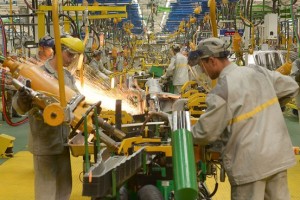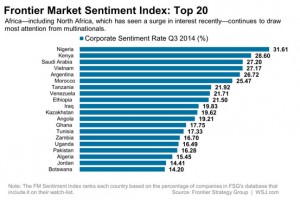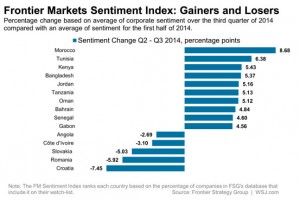By DAN KEELER
Renault’s $1.2 billion investment in its factory in Morocco
is prompting other multinational companies to look for
opportunities in the North African country.
Agence France-Presse/Getty Images
Corporate sentiment toward frontier markets has improved noticeably over the past three months, according to the latest WSJ Frontiers/FSG Frontier Markets Sentiment Index. Based on a sample of around 200 multinational companies, the index, created exclusively for WSJ Frontiers by Washington-based consultancy Frontier Strategy Group, suggests companies are sharpening their focus on key frontier countries such as Kenya, Saudi Arabia and Morocco.
Africa continues to attract more attention than any other region, contributing five of the countries in the top 10, and 12 of the countries in the top 20. But the data demonstrated a noticeable increase in corporations’ interest in North Africa. In the previous survey, published in June this year there were nine sub-Saharan African countries among the top 20 and only two—Morocco and Algeria—from North Africa.
The FM Sentiment Index is compiled from data gathered by FSG detailing which countries its multinational companies are watching for potential future investment. The data provide two key metrics: absolute sentiment, measured by the number of companies including a particular country on their watch lists, and the change in sentiment over the past quarter.
In the third-quarter survey, Tunisia joined its North African neighbors in the top tier and Morocco jumped from 12th to 6th. Morocco and Tunisia also saw the greatest positive change in sentiment as changing global dynamics encouraged firms to take a renewed interest in North Africa.
David Wickham, London-based director for global frontier and emerging markets at HSBC, attribute’s Morocco’s increasing popularity among corporations to its “relative political stability, its favorable legal environment for foreign investment, the availability of skilled workers with wages much lower than those in the European Union, and its close proximity to Europe.”
Mr. Wickham believes multinationals have also taken note of the fact that in 2012 auto manufacturer Renault invested $1.3 billion in 300-hectare car assembly plant in coastal city of Tangier.
According to Mamoune Bouhdoud, Morocco’s minister delegate for industry trade investment and the digital economy, the automotive sector is experiencing double-digit growth and represents one of the key elements of the country’s export mix. But, he says, the production of complete cars is just the “visible part of the iceberg. There is a whole range of SMEs working in this sector—suppliers for Renault in Tangier—and also huge exports of parts for factories in Europe.”
While Morocco’s proximity to Europe and its free-trade agreements with Europe and the U.S. are key factors in attracting foreign investment, Mr. Bouhdoud believes its relationship with Africa is an increasingly important factor. “Everyone believes Africa is the next area of growth,” he notes. “The problem is, there are a lot of countries in Africa and if you want to make your investment valuable you need to find a place where you can put your headquarters. You need to manage your risk. You need a strong country with great connectivity. Morocco could be this for foreign companies.”
Those foreign companies are clearly looking for opportunities in Africa. Sub-Saharan Africa has tightened its grip on the FM Sentiment index, with Nigeria retaining its leading role as the frontier-market country most corporations are watching, and Kenya leaping into second place from fifth in the previous survey.
Despite the fact that much of the news emerging from Africa over the past three months has been negative, says FSG’s global head of advisory and analytics, Matt Lasov, multinational corporations are staying the course in sub-Saharan Africa. “While the unprecedented and tragic outbreak of Ebola is affecting short-term headline growth rates, it is also temporarily changing the structure of affected economies, boosting certain sectors,” Mr. Lasov explains. “In Nigeria, for example, aviation, hospitality and tourism are suffering, but e-commerce has benefitted as more people shop online instead of in public markets.”
Two East African nations that traditionally have failed to attract much investor attention joined the top 10 this quarter. Tanzania, which has seen some huge discoveries of natural gas off its Indian Ocean coast, and Ethiopia, with its near-100 million population and stable government, are both attracting more attention from multinationals.
At the same time, sentiment toward Central and Eastern Europe (CEE) declined sharply as the region was hobbled both by the continuing torpor in Western Europe’s economy and the turmoil in Ukraine. Of the 68 countries included in the index, the three worst performers over the past three months are all in Central Europe. Croatia, which had seen a revival in corporate interest earlier this year, fell hardest with a 7.45 percentage point slump in the index, followed closely by Romania and Slovakia.
Multinationals showed less interest in 20 of the 68 countries in the index, of which 11 were in the CEE region. FSG’s Mr. Lasov believes companies are taking less notice of Central European countries because they’re small. “More multinationals are putting Central Europe and the Balkans into their own organizational structure, grouping the larger Russia/CIS division into a separately managed unit that gets more corporate attention. Central European markets are small, and well-penetrated across industries, reducing corporate attention there,” he adds.
Asia’s frontier markets saw some improvement in sentiment, with Bangladesh, Sri Lanka and Laos all finding a place among the 20 countries that saw the sharpest increase in attention. Pakistan, which experienced the greatest rise in attention in June’s results, attracted only slightly more interest from companies. Vietnam experienced only a modest increase in the number of companies tracking it but retained its status as the only Asian frontier market in the top 10.
Argentina and Venezuela are also still resolutely among the top 10 frontier countries that companies are focused on, but Mr. Lasov attributes that partly to the fact that many multinationals have substantial investments in the two troubled Latin American economies and are anxious to understand developments there.
WSJ Frontiers will be reviewing the FM Sentiment Index on a quarterly basis.
Write to Dan Keeler at dan.keeler@wsj.com.










